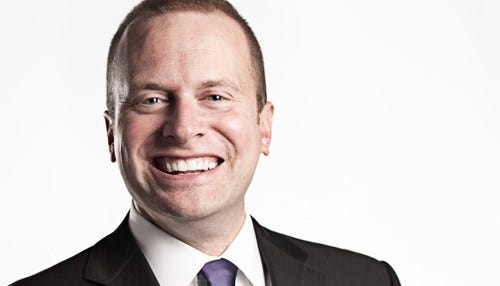A Full-Court Press on Poverty

Subscriber Benefit
As a subscriber you can listen to articles at work, in the car, or while you work out. Subscribe NowI recently participated in a panel discussion organized by the Faith & Action Project at the Christian Theological Seminary and featuring best-selling author Michelle Alexander, who spoke passionately about mass incarceration and its impact on persistent poverty, an issue of dismal urgency to Indianapolis.
Poverty isn’t typically considered a ‘Chamber of Commerce’ issue. But as I said during the panel, we have to get real about Indy’s challenges; poverty isolates more than 100,000 of our neighbors from opportunity. Reducing this number isn’t about charity, it’s about talent: We need more people participating in our workforce and contributing to our economy – the meaning of ‘inclusive growth.’
An inclusive economic agenda curbs poverty and creates new business opportunities; for example, the decade-long push by the Chamber and others to expand mass transit is helping people with limited job options connect with employers looking for reliable workers – a win-win proposition.
Transit can help people get to work, but we also have to focus on the neighborhoods these commuters return to: As lower-income families are increasingly crowded into high-poverty areas, they face higher crime rates, fewer options for healthy food, medical care and other necessities, among other challenges.
That’s why the Chamber is working with the Local Initiatives Support Corporation (LISC) and Indianapolis Neighborhood Housing Partnership (INHP) on redevelopment programs like ‘Great Places 2020.’ The same partners, along with Employ Indy, are also in the second year of a sweeping initiative to encourage major non-profit employers – ‘anchor institutions’ like hospitals and university campuses – to create business, employment and housing opportunities in the urban neighborhoods they also call home.
Good schools are neighborhood anchors too, and quality education is a powerful catalyst for upward mobility. The Indianapolis Public Schools is our largest school system, with a higher share of low-income students, and must be part of any serious dialogue on poverty, economic and workforce development.
IPS is improving, but struggles with budget deficits and high teacher turnover. Our commitment to help the district fix its financial woes and raise educator salaries aims to strengthen our future workforce and help today’s students compete in tomorrow’s job market – breaking the cycle of generational poverty.
We’ll also be advocating for publicly-funded, high-quality preschool education at the Statehouse (again) in 2019. Ensuring that lower-income children go school ready to learn is an early – and essential – investment in improving their odds of eventually escaping poverty; access to affordable pre-k also removes childcare as a barrier for parents pursuing employment and educational opportunities.
There are a litany of other business priorities with anti-poverty implications; for example, incentives to bring new investment to the blighted ‘brownfield’ properties in urban neighborhoods. But Michelle Alexander’s original topic – the inequities and consequences of incarceration – deserves attention as well.
Without wading too deeply into criminal justice policy, it’s clear that the roughly 10,000 ex-offenders living in Marion County face unique hurdles in re-entering the workforce, leaving them vulnerable to poverty…and the lure of recidivism. We’re better served by creating pathways to productive employment.
The Chamber has lobbied for policies that make it easier for businesses to hire ex-offenders, and to extend public assistance (like SNAP) as they get back on their feet. Our Entrepreneur Services team has gone further in creating a unique program, the Re-Entry Development Initiative (REDi), that offers entrepreneurship training and business coaching to currently- and formerly-incarcerated Hoosiers.
Now entering its third year, REDi has provided thousands of hours of classes and coaching to more than 200 participants. ‘Graduates’ gain knowledge that can help them eventually launch their own business, or in the short-term make them more attractive potential employees for smaller, up-and-coming local companies that need start-up savvy.
On October 22nd – the day before the Faith & Action Project panel convened at Clowes Hall – REDi hosted its first ‘Pitch Night’ at the John Boner Center on the Near Eastside.
Five current and aspiring business owners presented their plans to a panel of experts. At the end of the evening, Kenneth McKinney and his company, Promise Credit Solutions, earned the first-place prize of cash and professional services. But all of the participants are winning by pursuing their entrepreneurial dreams – and programs like REDi are helping win the battle to uproot poverty with economic empowerment.
I’ve covered a lot of ground in a few hundred words. But that reflects the realities of poverty, a complex issue that demands a strong commitment from all of us, including the business community. Lower poverty means higher wages, a broader tax base, greater productivity and a stronger job market. Lifting local families into the middle class isn’t just a moral imperative – it’s an economic necessity.
Michael Huber is president and chief executive officer of the Indy Chamber.
